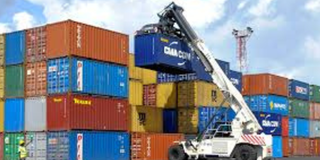Cargo destined for South Sudan stuck at different Kenyan facilities

Hundreds of vehicles and containers of cargo destined for South Sudan are stuck at different port facilities.
What you need to know:
- South Sudan on March 1 introduced a $350 (Sh46,000) Electronic Cargo Tracking Note (ECTN) for each transport.
- The cargo despite being cleared by the Kenya Revenue Authority (KRA) for transit, has been detained.
Hundreds of vehicles and containers of cargo destined for South Sudan are stuck at different port facilities due to the introduction of a $350 (Sh46,000) Electronic Cargo Tracking Note (ECTN) for each transport unit by the South Sudan Revenue Authority (SSRA).
The cargo despite being cleared by the Kenya Revenue Authority (KRA) for transit, has been detained before getting a clearance by the South Sudan tax man upon paying the requisite fee.
South Sudan Minister of Finance and Planning Dr Bak Barnaba Chol informed shippers of the new recommendations where transit cargo has to be tracked through ECTN in a gazette notice dated March 1 this year.
The introduction of the ECTN has been blamed for the delay as Kenyan clearing and forwarding agents protest payment of $350 to a private firm appointed by the SSRA.
Chairman Kenya International Freight and Warehouse Association (Kifwa) Roy Mwanthi said more than 1,000 containers have remained uncollected at different port facilities due to the introduction of the ECTN.
“We are asking the South Sudan government to rescind its decision to introduce the ECTN which adds no value since we already have the Regional Electronic Cargo System (RECTS) which is accepted across the East African Community member states. We feel this is another Non-Tariff Barrier (NTB) being introduced along the Northern corridor,” said Mr Mwanthi.
He added, “The introduction of the ECTN service charge of $350 will lead to massive delays in clearance of South Sudan cargo leading to high demurrage and truck detention charges which at the end will be borne by Kenyan agents.
We proposed that processing and collection of the ECTN service charge should be by South Sudan agents and within South Sudan customs areas.”
Early this month, the South Sudan government said the more than 1.5 million metric tonnes of cargo passing through Mombasa port to South Sudan will have to be tagged before leaving the country as the country put up measures to control the illegal, and undeclared entry of goods into the country.
The country appointed INVESCO Uganda Limited as the legally contracted agency under supervision by the SSRA to operationalise ECTN. Other partners such as PANDA and Crawford Capital are supposed to integrate.
“ECTN will be mandatory for all goods destined to South Sudan and all goods leaving the country with immediate effect. The sole purpose of the ECTN is to help the government of South Sudan to maximise its revenue collection by remedying the challenges of underestimation, undervaluation, diversion of cargo and round-tripping,” said Dr Chol.
During the stakeholders meeting, traders questioned why the charges were being handled by a Uganda company instead of South Sudan customs.
ECTN also known as Waiver Certificate is a mandatory shipping document for importing cargo to 25 African countries.
The cargo tracking note is designed to provide local customs authorities with the required information and visibility about the import shipment
With this arrangement, no South Sudan cargo will leave or enter Kenyan Kenya without ECTN.
South Sudan has been struggling with cases of illegal and undeclared entry of goods into the country. Some of the goods are expired while others are of substandard quality.
Read: Project targets 261,000 women in South Sudan for empowerment
For instance, in 2022, the National Ministry of Trade and Industry witnessed illegal night entry of sub-standard commodities into the Country by some traders.
Former undersecretary of the ministry, Mary Akec affirmed at the time that sub-standard goods were being smuggled to the country at night when border officials go off duty.
Not only that, in October last year, the South Sudan National Bureau of Standards impounded 62 trucks carrying afro-toxic grains.





